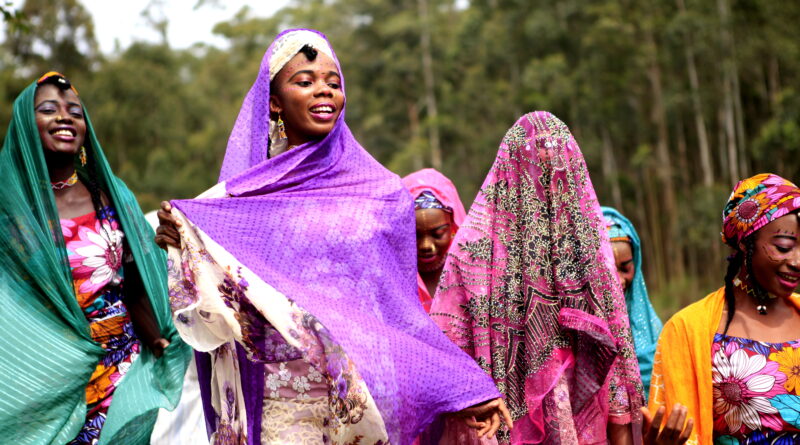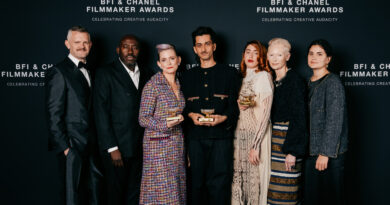European Premiere – The Milkmaid
Two sisters, abducted by religious extremists, fight for their lives, freedom, and their sanity.
The Milkmaid–Nigeria’s first-ever qualifying submission for Best International Feature Film at the Academy Awards – will have its European premiere at 2pm Saturday 10 July 2021 at BFI Southbank as part of the BFI African Odysseys programme, followed by a one-off Q&A with Director Desmond Ovbiagele and Executive Producer Oluseun Sowemimo.
An unflinching exploration of the human cost of the religious extremism sweeping across the African continent like a virus, The Milkmaid tells the story of two sisters, Aisha and Zainab, who are abducted from their village on Zainab’s wedding day in a deadly attack. This traumatic encounter forever alters their path, destroying their relationships and forcing them to fight for their lives, their freedom, and their sanity.
A story about Nigeria, made by Nigerians, Ovbiagele’s film – told through Hausa, Fulfulde and Arabic – it combines stunning cinematography with a powerful script to shine a spotlight on the ordinary people victimised by extremist terrorists, transforming them from another horrifying statistic into real, flesh-and-blood characters with lives, loves, desires, and hopes.
The crew themselves overcame unimaginable challenges while filming in order to complete the film.The team were apprehended at a checkpoint when their cargo – including props for the film – was deemed suspicious by local police. The situation escalated when a member of the local community – believing the crew to be insurgents themselves – advocated for violence. A number of the team were severely beaten and detained for several days before they could convince officers of their innocence and be allowed to continue on their way, as seen in the documentary: The Making of The Milkmaid.
In The Milkmaid, Ovbiagele skilfully juxtaposes the visceral horror and harrowing ordeal faced by victims of conflict with the serene natural beauty of West Africa – especially the jungle, forest, and mountains of Taraba State in north-eastern Nigeria. Ovbiagele approaches difficult topics sensitively, carefully considering how trauma and indoctrination creates perpetrators of violence as often as it creates victims. Indeed, the filmmakers have taken the deliberate decision not to name the Islamic extremists as Boko Haram, commenting that the scourge of extremism has now transcended their most infamous group.
Director Desmond Ovbiagele said: “The religious extremist insurgency that has raged in northern Nigeria for almost a decade has reduced human lives in the consciousness of the general public to mere statistics, typically nameless and voiceless. Inspired by the two Fulani milkmaids depicted on the Nigerian ten naira note, I felt a strong obligation as a filmmaker to harness the considerable tools available within the medium of cinema to help give a voice to those, living or dead, who are not in a position to speak for themselves.”
Starring Anthonieta Kalunta and Maryam Booth and Gambo Usman Kona, The Milkmaid has already garnered critical acclaim, winning five Africa Movie Academy Awards for Best Film, Best Film in an African Language, Best Nigerian Film, Best Supporting Actress and Achievement in Make-Up, with UK and USA release dates to be confirmed.
Now in its 15th year, BFI African Odysseys programme monthly events at BFI Southbank, as well as larger seasons and celebrations of work by and about the African diaspora. The series is programmed by the African Odysseys Steering Group in collaboration with a cross section of activists, cultural figures and community leaders; the group also runs dedicated training and education and programmes to support diverse filmmakers and develop better understanding of Africa and African diaspora film culture.
Recent highlights of BFI African Odysseys include special screenings of Rafiki (Wanuri Kahiu, 2018), Toni Morrison: The Pieces I Am (Timothy Greenfield-Sanders, 2019), If Beale Street Could Talk (Barry Jenkins, 2018), Pressure (Horace Ové, 1974) and Sarraounia, an African Queen (Med Hondo, 1986) and seasons exploring work by and about the African diaspora that were subject to censorship (Black and Banned, October 2018) and a series of documentaries which highlight the injustices experienced by Black British communities at the hands of the police (African Odysseys Presents: Injustice, September 2020).
BFI Southbank is currently operating with robust health and safety measures in place, including social distancing and the wearing of face coverings as standard. The cinema will continue to operate with these measures until government guidance advises otherwise. A full list of the health and safety measures can be found on the BFI website.




